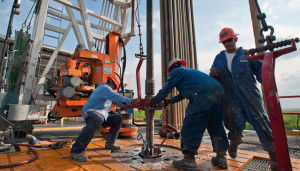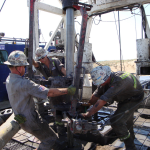The majority of oil rigs usually have 2 or 3 crews that consist of a few people conducting different kinds of jobs. Basically, the driller is responsible for supervising every single crew while he himself is supervised by the rig manager or toolpusher. His responsibilities are in a way like those of the rig manager: carry out all procedures in a safe and efficient manner while managing to be in accordance with government and company guidelines.
Oil Driller – Job Responsibilities
In order for a oil driller to be successful and good at his job he is to have perfect organizational skills, be communicative as well as able to listen, be able to work well with others and manage to work quickly while at the same time keep an eye on detail. Along with supervising a particular crew the driller is to operate the drilling and hoisting equipment of the oil rig, manage the rig floor, operate the driller’s console which features monitors, brakes, clutches, throttles and a large number of gauges. The readings and feedback that a driller manages to acquire from the console enable him to make the necessary adjustments.
Below are some of the responsibilities a Oil Driller usually is appointed with:
- Monitor oil rig crews and make sure they are performing their tasks in a competent manner and in accordance with company policies

- Enforce rules regarding wearing proper work attire such as Personal Protective Equipment (PPE)
- Carry out safety meetings on a regular basis and ensure for all crew members to take them seriously
- Perform drills like blowout prevention (BOP) drills
- Check up on equipment regularly and record related data in a log
- Test the knowledge of the crew and their understanding of the said meetings, drills and checks
- Help orient all new members
- Complete all required documentation found in personnel files, regarding equipment checks, necessary permits, etc.
Similarly to a rig manager, a oil driller may be required to have a number of certifications for him to be able to do a proper job at his position. Additionally, if one has the training and necessary certificates it would be of great help for him to move into the higher paying job positions with a larger number of responsibilities. Among the things to consider are various types of specialized safety training (handling hazardous materials, fall protection, high angle rescue operations) and first aid training.
Oil Driller salary
A driller’s salary depends on his experience in the field and training, and is usually a fixed day rate along with living allowance. The average pay of a oil driller operator is roughly USD 18-28 per hour.




